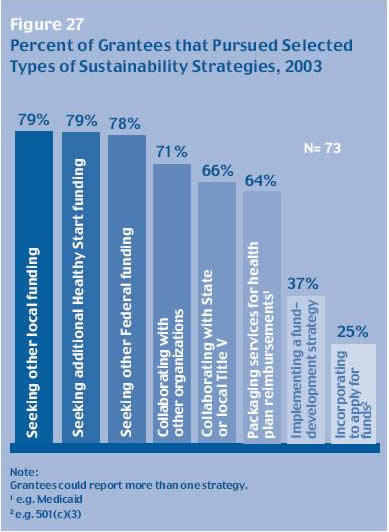In 2001, the national Healthy Start
program emphasized the importance of sustainability,
and directed grantees to develop a plan
for the continuation of Healthy Start
services at the end of their grant cycle.
Three-quarters of Healthy Start grantees
reported having a sustainability plan
as of December 2003. A majority of them
identified sustainability strategies that
involved the pursuit of additional financial
support – either through other local
funding (79 percent), additional Healthy
Start funding (79 percent), or other Federal
funding (77 percent). However, over two-thirds
of grantees with a sustainability plan
indicated that they did not have agreements
in place with any entities to absorb their
projects’ services.
Sustainability strategies employed by
State health departments differed significantly
from those of other grantees. Of the 9
State health department grantees that
had sustainability plans, less than half
(44 percent) sought other State or local
funding. In comparison, most local health
departments (88 percent), non-profit organizations
(84 percent), and all other remaining
agencies (71 percent) sought such funding.
Moreover, no State health department grantee
had implemented a fund-development strategy,
while a sizeable proportion of local health
departments (38 percent), non-profits
(48 percent), and all other agencies (29
percent) had implemented such a strategy.
State health department grantees were
also less likely to develop collaborative
efforts with other organizations (22 percent),
compared to grantees associated with local
health departments (73 percent), non-profits
(84 percent), and all other agencies (71
percent). However, State health department
grantees were more likely to incorporate
in order to apply for other funds (70
percent), compared to local health departments
(13 percent), non-profits (19 percent),
and all other agencies (29 percent). The
State health departments that listed incorporation
as a strategy planned to apply for 501(c)(3)
status for their local consortia, which
would eventually assume responsibility
for Healthy Start fundraising and become
the body that oversees programming and
services at the end of the third grant
cycle. |
 [D] [D]
|